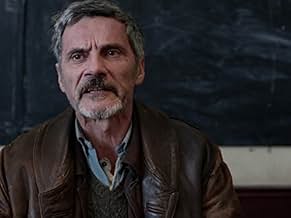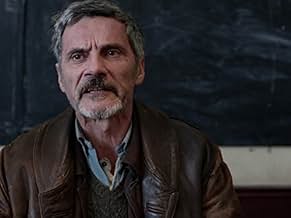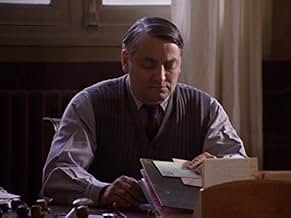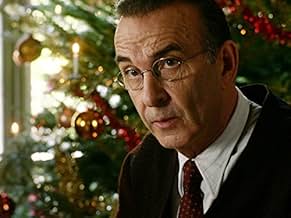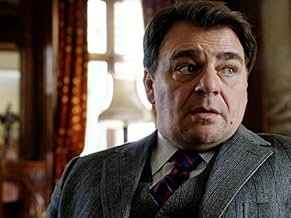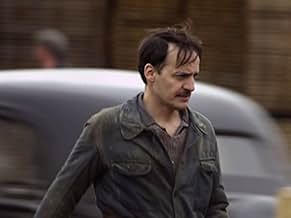Un village français
- TV Series
- 2009–2017
- Tous publics
- 52m
Traces the experiences of various residents of a fictional small village just inside the occupation zone during WWII. Deals with issues including collaboration, the Resistance, the fate of F... Read allTraces the experiences of various residents of a fictional small village just inside the occupation zone during WWII. Deals with issues including collaboration, the Resistance, the fate of French Jews, and war profiteering.Traces the experiences of various residents of a fictional small village just inside the occupation zone during WWII. Deals with issues including collaboration, the Resistance, the fate of French Jews, and war profiteering.
- Awards
- 2 wins & 10 nominations total
Browse episodes
Featured reviews
It always sounds really good to take a big, historical event and tell the story through the lens of a handful (or in this case a couple of dozen) characters. It is much harder to execute and more often than not the execution disappoints.
This is the exception. Un Village Francais is a masterful telling of the history of WWII France through the lens of a small village. Those who know their history know that France had a unique history during WWII as they neither remained fully free nor were they entirely occupied by the Nazis.
The show explores all of those dynamics, the naivete of the early German occupation (a reaction that makes sense in the context of a continent whose entire history is built around countries constantly coveting the land of others and seemingly constant wars), the problems that came with the full-on German occupation and the series even lasted long enough to explore the important and timeless themes raised in a post-war France.
The cast is top-notch, the drama is constant and the character arcs over the 7 seasons are almost unbelievable. As war would transform anybody, these characters by the end are almost unrecognizable from how they began.
It is one of the greatest television shows of all time.
This is the exception. Un Village Francais is a masterful telling of the history of WWII France through the lens of a small village. Those who know their history know that France had a unique history during WWII as they neither remained fully free nor were they entirely occupied by the Nazis.
The show explores all of those dynamics, the naivete of the early German occupation (a reaction that makes sense in the context of a continent whose entire history is built around countries constantly coveting the land of others and seemingly constant wars), the problems that came with the full-on German occupation and the series even lasted long enough to explore the important and timeless themes raised in a post-war France.
The cast is top-notch, the drama is constant and the character arcs over the 7 seasons are almost unbelievable. As war would transform anybody, these characters by the end are almost unrecognizable from how they began.
It is one of the greatest television shows of all time.
This is a truly remarkable, riveting, and even addictive TV series, certainly one of the best I have ever seen, regardless of language. (I'm 64. I've seen a lot of TV series.) What makes it remarkable? The acting is uniformly first-rate, the direction very good, the script even better than first-rate. Each episode holds you from the get-go, and many end with cliff-hangers that make you want to start the next episode. As I said, it is downright addicting.
Are there any flaws? I don't know that I would call them flaws, but I can see that those interested in the history of the Occupation in France could have several issues with the series.
1) A previous reviewer wrote that it is an "Excellent TV show explaining the life of ordinary people in Nazi occupied France." Not really true. The main French characters are almost all members of the haute bourgeoisie: a leading doctor, a factory manager, the chief of police, etc. They do not deal with the issues that friends of mine remember from the Occupation: the shortage of everything, starting with food and fuel to heat homes. For ordinary French people, the Occupation was four years of waiting in line every day for bare necessities, punctuated by an occasional dramatic event. That wouldn't make for good TV drama, though, so this series has made the dramatic more "common" than it evidently was in the life of the average French person. The episodes almost all focus on dramatic events. It makes for riveting viewing, certainly, but it gives a skewed view of daily life during the Occupation.
2) Much of the focus is on sex and marital infidelity, rather than issues specific to the Occupation. (It reminds me a lot of Zola's Germninal in that sense.) This holds audiences, certainly, but there is nothing particularly related to the Occupation here. Almost all the wives turn out to be unfaithful to their husbands. I'm not sure how a feminist would react to that, or indeed many French women, faithful to their husbands or boyfriends, who lived through the era.
3) The depiction of the Communist Party leaders is uniformly negative. Again, the focus seems to be very bourgeois, very much Gaulliste. I noticed, for example, that when others, even Gaullistes like Bériot, refer to the Communists as Bolsheviks, that just gets translated as Communist. There is, of course, a big difference there. It is very true that many non-Communists feared the Communist Resistance and feared that their goal was to lead France into another class war/revolution, but that was not in fact the goal of all the FTP/Communist resistants.
All that said, I repeat that this is a riveting series. You will not regret watching it - except that you may well become addicted to it.
-----------------
I have now watched through the end of Season 6, which is as far as the American distribution has gone as of January 2017. (Season 7 is announced for mid-February.) All I have to add to what I wrote above is that this series does a remarkable job of making all the lead characters, no matter what their political position, very human and very three-dimensional. No one is all bad, and virtually no one is all good. That becomes very problematic for me in the case of the Militiamen and some of the Germans, the SS and the Gestapo. I don't like feeling sympathy or compassion for individuals who have committed monstrous crimes, as some of these characters do. Nevertheless, I will concede that even someone who can shoot two little children in cold blood - that is a VERY difficult scene to watch - might also have human qualities. I don't like conceding that, but I will.
The end of episode 12 of Season 6 turned my blood cold. It focused on some of the worst events of the Liberation, and made it anything but a joyous event. I know, having interviewed people who lived in a small town in France at that time, that what is described did indeed take place across France. Some of it is even toned down, like the shearing of the women accused of collaboration with the Germans. Still, it is a particularly somber note on which to end the penultimate season.
Are there any flaws? I don't know that I would call them flaws, but I can see that those interested in the history of the Occupation in France could have several issues with the series.
1) A previous reviewer wrote that it is an "Excellent TV show explaining the life of ordinary people in Nazi occupied France." Not really true. The main French characters are almost all members of the haute bourgeoisie: a leading doctor, a factory manager, the chief of police, etc. They do not deal with the issues that friends of mine remember from the Occupation: the shortage of everything, starting with food and fuel to heat homes. For ordinary French people, the Occupation was four years of waiting in line every day for bare necessities, punctuated by an occasional dramatic event. That wouldn't make for good TV drama, though, so this series has made the dramatic more "common" than it evidently was in the life of the average French person. The episodes almost all focus on dramatic events. It makes for riveting viewing, certainly, but it gives a skewed view of daily life during the Occupation.
2) Much of the focus is on sex and marital infidelity, rather than issues specific to the Occupation. (It reminds me a lot of Zola's Germninal in that sense.) This holds audiences, certainly, but there is nothing particularly related to the Occupation here. Almost all the wives turn out to be unfaithful to their husbands. I'm not sure how a feminist would react to that, or indeed many French women, faithful to their husbands or boyfriends, who lived through the era.
3) The depiction of the Communist Party leaders is uniformly negative. Again, the focus seems to be very bourgeois, very much Gaulliste. I noticed, for example, that when others, even Gaullistes like Bériot, refer to the Communists as Bolsheviks, that just gets translated as Communist. There is, of course, a big difference there. It is very true that many non-Communists feared the Communist Resistance and feared that their goal was to lead France into another class war/revolution, but that was not in fact the goal of all the FTP/Communist resistants.
All that said, I repeat that this is a riveting series. You will not regret watching it - except that you may well become addicted to it.
-----------------
I have now watched through the end of Season 6, which is as far as the American distribution has gone as of January 2017. (Season 7 is announced for mid-February.) All I have to add to what I wrote above is that this series does a remarkable job of making all the lead characters, no matter what their political position, very human and very three-dimensional. No one is all bad, and virtually no one is all good. That becomes very problematic for me in the case of the Militiamen and some of the Germans, the SS and the Gestapo. I don't like feeling sympathy or compassion for individuals who have committed monstrous crimes, as some of these characters do. Nevertheless, I will concede that even someone who can shoot two little children in cold blood - that is a VERY difficult scene to watch - might also have human qualities. I don't like conceding that, but I will.
The end of episode 12 of Season 6 turned my blood cold. It focused on some of the worst events of the Liberation, and made it anything but a joyous event. I know, having interviewed people who lived in a small town in France at that time, that what is described did indeed take place across France. Some of it is even toned down, like the shearing of the women accused of collaboration with the Germans. Still, it is a particularly somber note on which to end the penultimate season.
This is the Most extraordinary show I've ever seen in my 60 year life. The depth and evolution of the characters is flawless. The pain and guilt of the occupation is palpable and touched me in ways I never anticipated. While the show was wrenching at times to watch, I can't imagine a better rendition of such a painful and revelatory experience.
I can't recommend enough!
Postscript: Since finishing the series and writing this review, I've been searching for one word to describe the experience of Un Village Français....The word is haunting...
I can't recommend enough!
Postscript: Since finishing the series and writing this review, I've been searching for one word to describe the experience of Un Village Français....The word is haunting...
Having watched all 65 episodes (seven seasons), I'm overwhelmed by how the scriptwriters not only confronted French viewers with all the gray areas involving their parents or grandparents' collaboration with the Nazis during the time of the Vichy government but also created such complex characters that we sometimes find ourselves booing and hissing the alleged "good guys" and cheering some characters who have behaved in an abominable fashion. But then, the "good guys" can turn out to be more evil than we supposed, and some "bad guys" can readily accept responsibility for all their actions, no matter how monstrous. Some of the most corrupt characters are also the most pragmatic survivors.
Those who stick with the series until the end had better get their hankies ready for the final, completely heart-wrenching two episodes.
The actors are uniformly exceptional in this ensemble cast of hundreds. Most of all, I will never forget Nicolas Gob as Jean Marchetti, a French cop who obeys every command involving the rounding up of Jews or Communists for execution and deportation until he falls for a Jewish woman, Rita (Axel Maricq). But by then, he has acquired the nickname, "Butcher of Villeneuve."
Then there are Robin Renucci and Audrey Fleurot as Dr. Daniel and Hortense Larcher. Dr. Larcher finds himself unwillingly thrust into the position of town mayor whose scruples are compromised one by one until he finds himself compiling death lists with another official, Servier (Cyril Couton), to quench the Nazi thirst for blood in retaliation for Resistance violence done to them, an action that will later have dire repercussions for both men. As for Hortense Larcher, she finds herself attracted to a Nazi leader, Heinrich Muller (Richard Sammel) and is ready to forgive his every sadistic cruelty.
Then there's Lucienne (Marie Kremer), a schoolteacher who falls for a handsome German soldier, Kurt (Samuel Theis) but when he's about to be transferred to the Russian front and she finds herself pregnant, she agrees to marry the headmaster, Bériot (François Loriquet), who is willing to adopt her child as his own.
Finally, there are the major Resistance fighters: Larcher's brother, Marcel (Fabrizio Rongione) and his mistress, Suzanne (Constance Dollé); and Marie (Nade Dieu), a farmer's wife, who is involved with the married owner of a sawmill, Raymond Schwartz (Thierry Godard), who initially is apolitical and gladly sells his product to the Nazis, but ultimately joins the Resistance. Then there's the young Resistance fighter Antoine (Martin Loizillon), who shamefully is forced to leave four buddies behind to be slaughtered by Nazi troops. Finally, there is Schwartz's wife, Jeannine (Emmanuelle Bach) who is determined to survive and prosper, no matter who rules the country.
For me, this is the finest, most engrossing series I've seen since the Spanish "Gran Hotel."
Those who stick with the series until the end had better get their hankies ready for the final, completely heart-wrenching two episodes.
The actors are uniformly exceptional in this ensemble cast of hundreds. Most of all, I will never forget Nicolas Gob as Jean Marchetti, a French cop who obeys every command involving the rounding up of Jews or Communists for execution and deportation until he falls for a Jewish woman, Rita (Axel Maricq). But by then, he has acquired the nickname, "Butcher of Villeneuve."
Then there are Robin Renucci and Audrey Fleurot as Dr. Daniel and Hortense Larcher. Dr. Larcher finds himself unwillingly thrust into the position of town mayor whose scruples are compromised one by one until he finds himself compiling death lists with another official, Servier (Cyril Couton), to quench the Nazi thirst for blood in retaliation for Resistance violence done to them, an action that will later have dire repercussions for both men. As for Hortense Larcher, she finds herself attracted to a Nazi leader, Heinrich Muller (Richard Sammel) and is ready to forgive his every sadistic cruelty.
Then there's Lucienne (Marie Kremer), a schoolteacher who falls for a handsome German soldier, Kurt (Samuel Theis) but when he's about to be transferred to the Russian front and she finds herself pregnant, she agrees to marry the headmaster, Bériot (François Loriquet), who is willing to adopt her child as his own.
Finally, there are the major Resistance fighters: Larcher's brother, Marcel (Fabrizio Rongione) and his mistress, Suzanne (Constance Dollé); and Marie (Nade Dieu), a farmer's wife, who is involved with the married owner of a sawmill, Raymond Schwartz (Thierry Godard), who initially is apolitical and gladly sells his product to the Nazis, but ultimately joins the Resistance. Then there's the young Resistance fighter Antoine (Martin Loizillon), who shamefully is forced to leave four buddies behind to be slaughtered by Nazi troops. Finally, there is Schwartz's wife, Jeannine (Emmanuelle Bach) who is determined to survive and prosper, no matter who rules the country.
For me, this is the finest, most engrossing series I've seen since the Spanish "Gran Hotel."
I wasn't sure about watching this series but I was really hooked by Episode 3 of the first season. However, a couple of my favorite French stars, Thierry Godard and Audrey Fleurot, drew me to the series. It was well worth it. I just completed the last season and have since purchased the entire series. I have never done that before.
The story behind the citizens of the town is intriguing all through their lives and to the final episodes as I watched them decline in health and appearance. It is a fascinating story of the Occupation and how the war affected these citizens of an obscure French village. Viewers were introduced to the harsh reality of war in France if you watched "Band of Brothers" but this shows the sorrow, death and troubling decisions citizens had to make as the war and occupation moved on.
I recommend this to all viewers. Yes, it takes a lot of time to watch it but it is worth it.
The story behind the citizens of the town is intriguing all through their lives and to the final episodes as I watched them decline in health and appearance. It is a fascinating story of the Occupation and how the war affected these citizens of an obscure French village. Viewers were introduced to the harsh reality of war in France if you watched "Band of Brothers" but this shows the sorrow, death and troubling decisions citizens had to make as the war and occupation moved on.
I recommend this to all viewers. Yes, it takes a lot of time to watch it but it is worth it.
Did you know
- TriviaThe town depicted in the series, Villeneuve, is fictional.
- GoofsIn a first-season episode set during 1940, a German soldier is shown wearing the Close Combat Clasp, a decoration which first began to be awarded in November, 1942.
- ConnectionsReferenced in Séries express: Episode #2.30 (2009)
Details
- Release date
- Country of origin
- Official site
- Language
- Also known as
- A French Village
- Production companies
- See more company credits at IMDbPro
- Runtime52 minutes
- Color
- Aspect ratio
- 1.78 : 1
Contribute to this page
Suggest an edit or add missing content


![Watch Bande-annonce Saison 1 [OV]](https://m.media-amazon.com/images/M/MV5BYjJkN2E2M2QtNjgyZS00NTVjLThlYzMtNjBlM2QxZTMxODMwXkEyXkFqcGdeQXRodW1ibmFpbC1pbml0aWFsaXplcg@@._V1_QL75_UX500_CR0)
